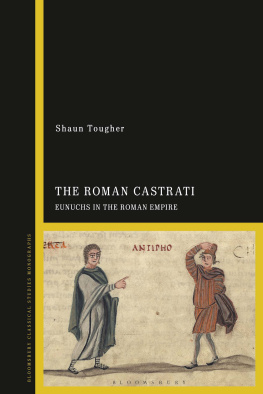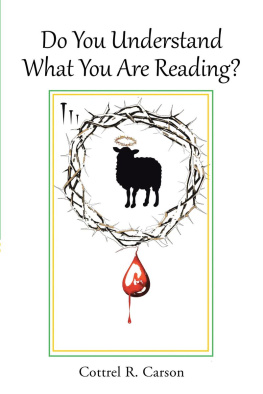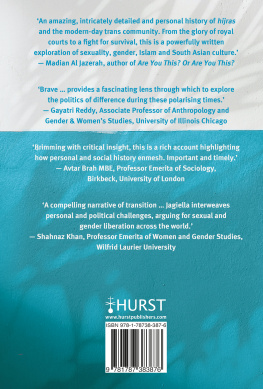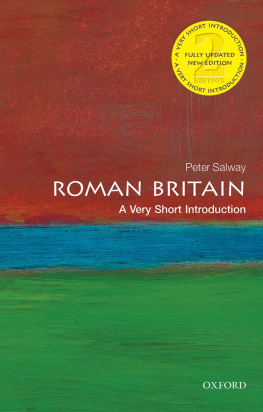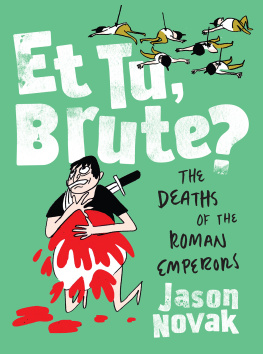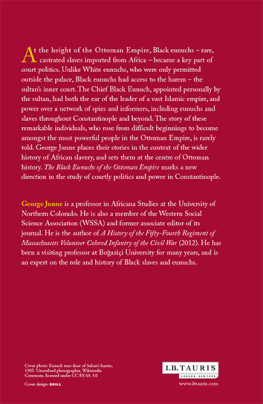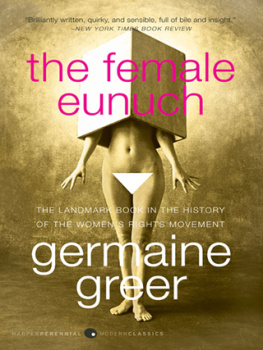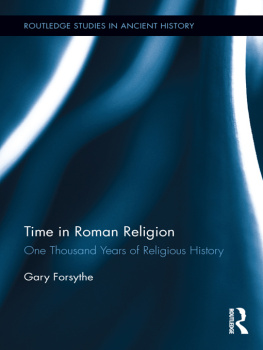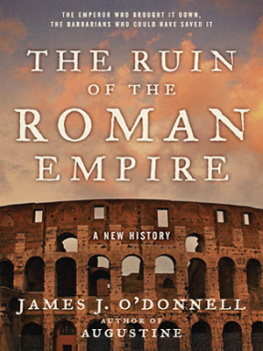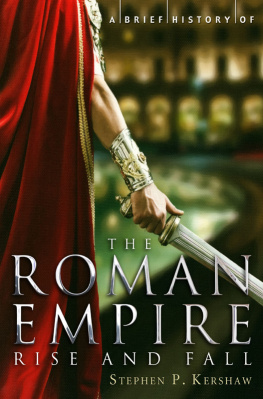
The Roman Castrati
For Mum
Also available from Bloomsbury
Gender and the Interpretation of Classical Myth, Lillian Doherty
Greek Homosexuality, K. J. Dover
Womens Life in Greece and Rome, Maureen B. Fant and Mary R. Lefkowitz

Contents
This book is a prequel. Having written a book on the eunuchs of the Byzantine Empire it seemed natural to write one on the eunuchs of the Roman Empire. The original intention was to write a book that was accessible to a broad audience, not one that was just for other academics and students. To this end the book focuses on case studies of individuals as well as examining discrete aspects of the history of Roman eunuchs from the third century BC to the sixth century AD . I hope also that the book fosters further study of eunuchs, a subject which has witnessed increasing research interest, fed no doubt by the centrality of the question of gender identity in their history. Gender naturally surfaces in this book but it is not a book about gender; rather it is primarily concerned with the lives and roles of eunuchs found in the Roman empire. The book has taken longer to complete than originally envisaged, not least because of heavy administrative burdens. It is a great pleasure finally to be able to acknowledge the debts incurred in the writing of it. I am extremely grateful for the enormous patience and support extended by the editors involved in the project, first Michael Greenwood and then Alice Wright. They have made the experience much less stressful than it might otherwise have been and have demonstrated great understanding of the pressures faced by academics today. I would also like to thank the anonymous reader who provided much-appreciated feedback. At Cardiff University colleagues provided specific advice and general support. In particular I thank Nicholas Baker-Brian, Guy Bradley, Eve MacDonald, Alex McAuley and Laurence Totelin, as well as the staff of the Arts and Social Sciences Library who went beyond the call of duty to assist me. Other academics beyond Cardiff provided invaluable material and guidance, and I thank especially Chris de Wet, Juan Lewis, Mark Humphries, Liz James, Shushma Malik, Lynn Roller, Ulrike Roth, Nancy evenko and Jamie Wood. Finally, friends in Cardiff and elsewhere provided much-needed support and comfort, in particular Vicki Cummings, Kate Gilliver, Shelley Hales, Mary Harlow, Scott Hieger, Ian Kinsella, Lloyd Llewellyn-Jones, Janett Morgan and Keir Waddington, and the gang of William, Jay, Rupert, Hester and Charlie.
Shaun Tougher
Cardiff, 17 March 2020
Biblioteca Apostolica Vaticana for permission to reproduce Codex Vaticanus Latinus 3868, folio 25v.
Harvard University Press for permission to reproduce material from: Philostratus and Eunapius translated by Wilmer C. Wright, Loeb Classical Library volume 234, Cambridge, Mass.: Harvard University Press, First published 1921. Loeb Classical Library is a registered trademark of the President and Fellows of Harvard College.
Statius, vol. 1 translated by D.R. Shackleton Bailey, Loeb Classical Library volume 206, Cambridge, Mass.: Harvard University Press, Copyright 2003, 2015 by the President and Fellows of Harvard College. Loeb Classical Library is a registered trademark of the President and Fellows of Harvard College.
| AASS | Acta Sanctorum |
| AJP | American Journal of Philology |
| AnBoll | Analecta Bollandiana |
| ANRW | Aufstieg und Niedergang der rmischen Welt |
| BF | Byzantinische Forschungen |
| BHG | Bibliotheca Hagiographica Graeca |
| BHL | Bibliotheca Hagiographica Latina |
| BMCR | Bryn Mawr Classical Review |
| Byz | Byzantion |
| CIL | Corpus inscriptionum latinarum |
| CP | Classical Philology |
| CQ | Classical Quarterly |
| DOP | Dumbarton Oaks Papers |
| JHS | Journal of Hellenic Studies |
| JLA | Journal of Late Antiquity |
| JRS | Journal of Roman Studies |
| PBSR | Papers of the British School at Rome |
| PCPS | Proceedings of the Cambridge Philological Society |
| PG | Patrologia graeca |
| PLRE | A.H.M. Jones et al. (eds), The Prosopography of the Later Roman Empire, 3 vols (Cambridge: Cambridge University Press, 197192) |
| P&P | Past and Present |
| REB | Revue des tudes byzantines |
| YCS | Yale Classical Studies |
| ZPE | Zeitschrift fr Papyrologie und Epigraphik |
Cleopatras eunuchs
| CLEOPATRA | Thou, eunuch Mardian! |
| MARDIAN | Whats your highness pleasure? |
| CLEOPATRA | Not now to hear thee sing. I take no pleasure |
| In aught an eunuch has. Tis well for thee |
| That, being unseminared, thy freer thoughts |
| May not fly forth of Egypt. Hast thou affections? |
| MARDIAN | Yes, gracious madam. |
| CLEOPATRA | Indeed? |
| MARDIAN | Not in deed, madam, for I can do nothing |
| But what indeed is honest to be done. |
| Yet have I fierce affections, and think |
| What Venus did with Mars. |
Thus runs an exchange between Cleopatra, the famous queen of Egypt, and her eunuch Mardian in William Plutarch echoes this Roman propaganda when he writes:
As soon as Octavius Caesar had completed his preparations, he had a decree passed declaring war on Cleopatra and depriving Antony of the authority which he had allowed a woman to exercise in his place. Octavius Caesar also gave it out that Antony had allowed himself to fall under the influence of drugs, that he was no longer responsible for his actions, and that the Romans were fighting this war
The Roman poet Lucans depiction of the court of Cleopatra and her brother Ptolemy XIII at the time of Julius Caesar, written in the mid-first century AD , also deploys these orientalist tropes:
There was also a swarm of attendants, and a multitude to serve the banqueters, differing from one another in race or age. Some had the hair of Africa, and others were so fair-haired that Caesar said he had never seen hair so red in the Rhine country; some had dark skins and woolly heads, with hair receding from the forehead. There too were hapless boys who had lost their manhood by the knife (Nec non infelix ferro mollita iuventis/Atque exsecta virum); and opposite them stood youths, whose cheeks, in spite of their age, were scarce darkened by any down. There the sovereigns sat down, and with them Caesar, greater than they. Cleopatra, not content with a crown of her own and her brother for a husband, was there, with her baleful beauty painted up beyond all measure: covered with the spoils of the Red Sea, she carried a fortune round her neck and in her hair, and was weighed down by her ornaments.
Despite the sensationalist depiction of the court there was a reality here. Eunuchs were a feature of the Ptolemaic kingdom, established in Egypt by the general Ptolemy after the death of Significantly, and despite wishing to create the impression that eunuchs were something eastern and alien, the Roman Empire itself did experience and utilize eunuchs.
Next page
